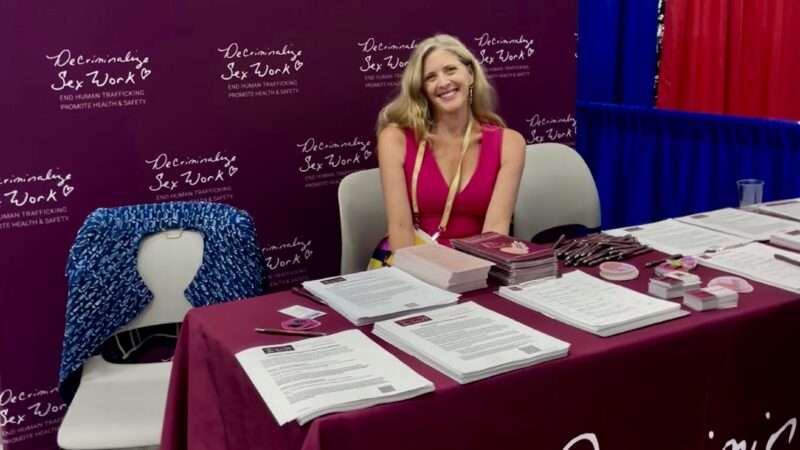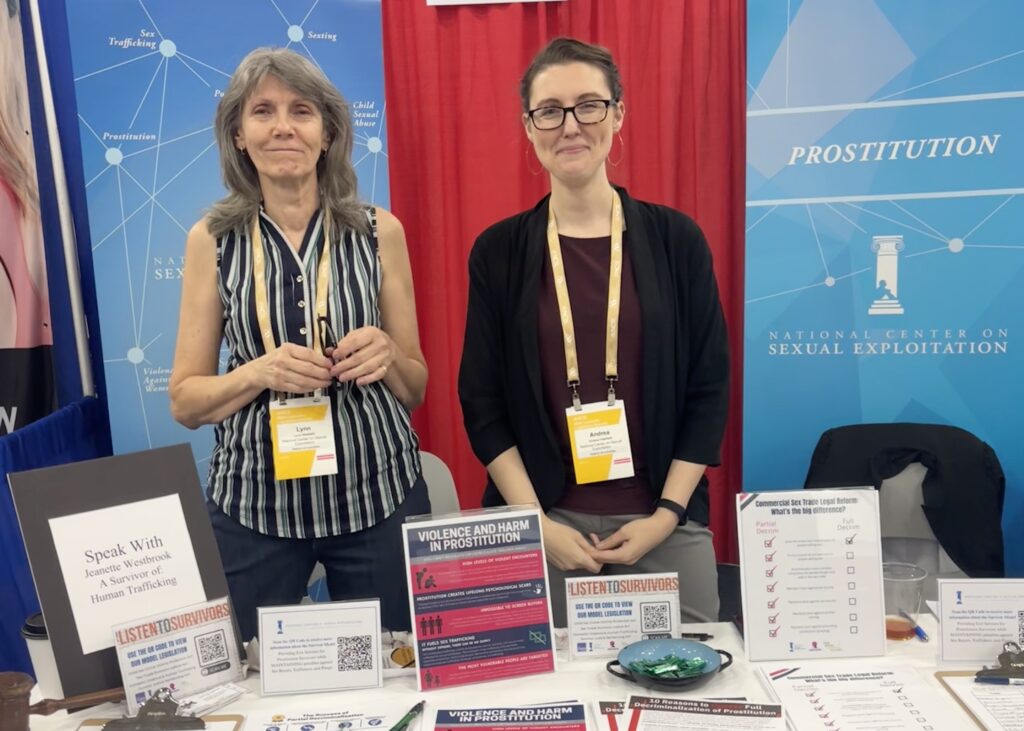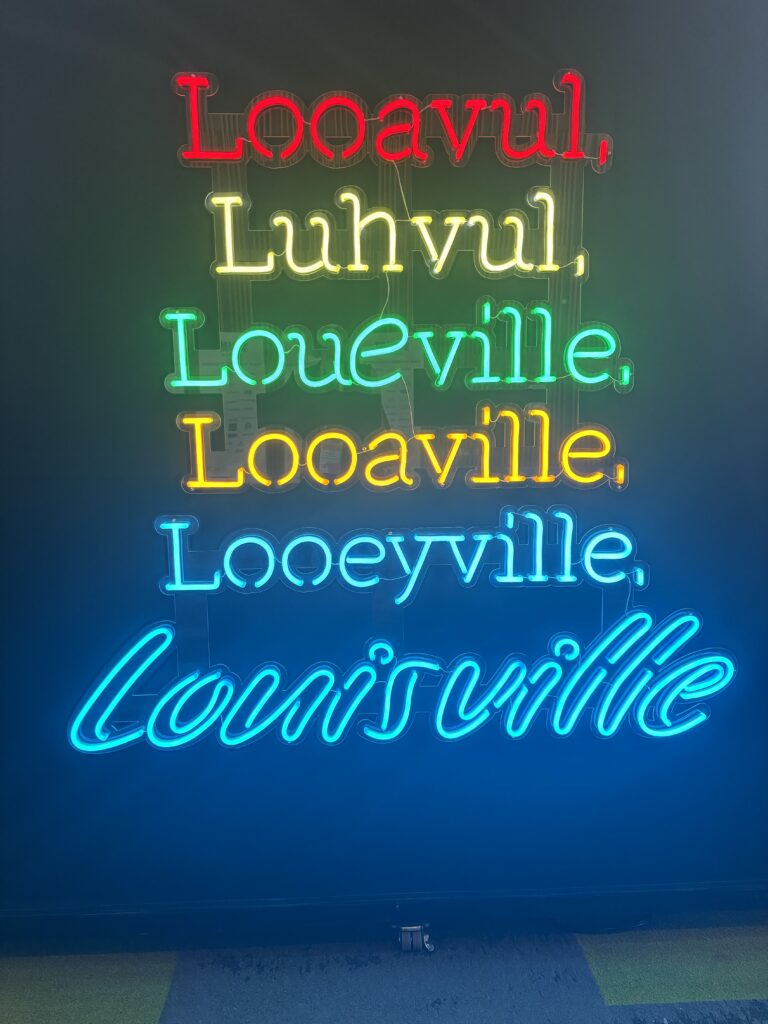
I spent some time last week at the National Conference of State Legislatures (NCSL) summit, which attracts state lawmakers and legislative staff from around the country and was held this year in Louisville, Kentucky. The event's expo hall was packed with hundreds of booths, largely featuring the sorts of associations, businesses, and nonprofits you might expect to be trying to influence state policy.
Perhaps not as expected was a sex worker rights group.
Not as expected, that is, if you don't know anything about Decriminalize Sex Work (DSW). Since its founding in 2018, the organization has been trying to influence state laws surrounding sex work by talking directly to lawmakers and their staff.
I saw down in the expo hall with DSW legal director Melissa Sontag Broudo to chat about what the group was doing there and how its message had been received by conference attendees.
I also talked with Andrea Hitefield, who was tabling for the National Center on Sexual Exploitation (NCOSE). Since NCOSE was also pushing for changes to state policies surrounding sex work, I wanted to ask Hitefield the same questions I'd posed to Broudo.
Below are condensed transcripts of our conversations, followed by a few thoughts.
'The conversations are overwhelmingly productive and positive'
Reason: What kind of policy changes are you pushing?
Melissa Sontag Broudo: We've come to NCSL every year for the last five years, really to educate legislators about what the array of legislative options are to support the health and safety of sex workers. Many people get a little nervous when they hear about full decriminalization of sex work, and that's understandable. But what we're really working on now, and will be for the next however many years, are really concrete measures that help the health and safety of sex workers—measures like immunity bills, which almost passed in Rhode Island and New York, and passed many other states in the last few years. Police sexual violence [legislation], which has yet to pass the Rhode Island State House. Mugshot bills, to minimize stigma against people that are arrested.
Reason: Just real quick, for people who don't know: What is an immunity bill?
Broudo: Immunity legislation allows people to come forward and report crimes committed against them or that they witnessed without being arrested themselves for prostitution. Very often, sex workers are targets of predatory violence, right? We saw this in New York with the Gilgo Beach Killer, who was just arrested a little under a year ago. We saw with Joey the Player in New Jersey, who was just sentenced to 20-some-odd years for consistently assaulting sex workers. Sex workers fear coming forward to the police for good reason. They fear coming forward to report crimes committed against them or that they witnessed.
And the thing is, we want, as a society—regardless of where you stand on sex work—we want people to come forward and say, "I started working at this club and some of the girls there seemed really young and I didn't feel comfortable." We want things that seem exploitative or harmful to be explored by people with the power to help and support people in need. And the way that everything is set up now is that everyone stays quiet. And so immunity would really allow people to come forward without fear of arrest.
Reason: When you talk about this with lawmakers or legislative staff here at the NCSL summit, what has the reaction been so far?
Broudo: I've been to NCSL now for the last number of years—obviously, there was a break because of COVID. But overall, I find that people are surprisingly amenable to our perspective. Because when it comes down to it, we're not asking actually for anything crazy. We're asking for health and safety of sex workers and survivors of trafficking. So I think there might be a bit of a disconnect at first, especially with our name, but I think once we actually start talking about the bills that we're introducing and advocating for and what our goals are, it's actually not this big scary thing that maybe they've read about. And so I would say the conversations are overwhelmingly productive and positive.
Reason: Why do you guys think it's important to be at an event like this?
Broudo: You know, every year that we're here, it sparks something. I had somebody from the Nurses Association in Illinois come and say, "You know what? We're interested in what's happening with sex worker activists in Chicago and supporting their health and safety." This is great. And just those connections, sort of connecting the dots for people that maybe this isn't their primary issue—and for most people, it's not—being like, "OK, now I get it. Now I understand why this group or this organization is advocating for things."
It also really concretely can spark legislative ideas for legislators or legislative staff. People come by and they're like, "Oh, I would introduce that bill. Let me take a sheet. Let me get your card and we'll communicate." And it can turn into a bill after this conference.
Or seeing legislators from states that we actively work in. We've had a few conversations today with Rhode Island legislators, and that's a state that I work in. And just to be able to debrief after what happened, to debrief at the end of the policy session and say, "Well, that was crazy" and "What can we do different next year?" So I find it to be the most pragmatic conference that we attend, for legislative goals.
Lawmakers react 'very positively' to partial decriminalization

Reason: What are the main policy goals that you guys are advocating?
Andrea Hitefield: We're focusing on partial decriminalization. We're not going for the full decriminalization, which the other side is over there. We're looking more at the Nordic model, which is what they're using in France, Norway, and Sweden and has had great success there. [The Nordic model criminalizes paying and attempting to pay for sex but decriminalizes offering or having sex for money, at least under certain circumstances.]
Reason: I know you guys differ on the decriminalization question, but it would seem that some of your goals are aligned. How does NCOSE feel about the immunity bills, for instance, that they're pushing? Do you know about those?
Hitefield: I don't. I'm new, so I'm not the best person to talk to for this.
Reason: They're the ones where a sex trafficking victim or a sex worker—someone who is in prostitution—can come forward and report crimes against them without being arrested themselves.
Hitefield: Yeah, I mean, I'm all for that.
Reason: That seems like something that maybe some common ground there?
Hitefield: Yeah, I feel like that's common ground. [Hitefield stressed to me after our interview that this was her personal opinion and not an official NCOSE position.]
We also have common ground on the fact that they support women being empowered, and we also love that idea, but we do believe that the full decriminalization of prostitution actually opens the floodgates to many other harms that are unintentional that result from the full decriminalization, such as human trafficking.
Reason: How have people here at the conference—legislative staff and lawmakers—reacted to you guys so far?
Hitefield: Very positively. I've only had two that were actually on the other side, and I mean, we had a great conversation as well,
Reason: So people are open to the Nordic model?
Hitefield: Oh, yeah. Yeah, so far. I think those who aren't might just be avoiding our booth.
Reason: I know Maine and New York, maybe more states, have passed or considered Nordic-style laws. Do you think we're going to more legislation to that effect in other states?
Hitefield: Yeah, I hope so. Yeah.
Reason: Have people here seemed receptive to that?
Hitefield: Yeah.
Common Ground?
Regular readers of my work will know that I'm much more sympathetic to the goals of DSW than to those of NCOSE. The latter—formerly known as Morality in Media—often seems to co-opt the language of women's rights to push censorship and suppression of sexuality in the public square more broadly. And as Hitefield noted, it pushes the Nordic model of prostitution criminalization, a system I find to be inferior to full decriminalization for a number of reasons, in addition to being philosophically offensive.
All that throat-clearing aside, it's interesting that NCOSE has latched onto the Nordic model. And perhaps that is, in some ways, an encouraging development.
I'm not sure on that last bit. A cynical take might say that since this model lends itself to framing most women in prostitution as victims, it's beneficial to pushing the narrative that sex trafficking is everywhere, which is then beneficial to pushing increased crackdowns on prostitution and harsher penalties for potential customers. That it's a wolf in sheep's clothing—a route to greater policing of prostitution that appears more compassionate while recreating many of the same dangers and harms for people selling sex.
But there's still the fact that a push for cracking down directly on sex workers is rhetorically risky. That, in itself, represents a kind of progress. There are many periods in which sex workers were framed as a scourge on society—"fallen women" who needed to be locked up for the greater good. Undoubtedly, there are still some people who think this, but it's no longer the prevailing view on sex work in the U.S. And while some of this surely comes down to increasing belief that sex workers lack agency (the "all victims" mentality), it also reflects a liberalizing of attitudes around sexuality.
Besides, there are surely plenty of people who genuinely want to help women in the sex trade and believe the Nordic model is the best route. And if persuading such people that another model (like legalization or decriminalization) is a bridge too far, they might at least be persuaded to support things like the immunity, police violence, and mugshot bills that DSW is pushing.
Maybe there actually is room for common ground between groups like DSW and NCOSE.
Or maybe not. I know sex worker rights activists have often had trouble working with Nordic-model supporters even on things that seem like they should be common goals. The latter can sometimes seem more interested in punishing "johns" than in protecting people in the sex trade, or unwilling to perceive of people existing in spaces in between perpetrator and victim.
But the fact remains that at this year's state legislatures conference, there were two extremely different groups pushing for lawmakers to stop arresting sex workers, and both reported positive responses from lawmakers and legislative staff. Whatever else is true, that at least seems like a positive step.
More Sex & Tech News
• The Trump campaign has been hacked.
• Did online misinformation fuel the U.K. riots?
• Sierra D. Peters, a doctoral candidate in social psychology at Florida State University and co-author of a new sociosexuality study in Personality and Individual Differences, told PsyPost: "For decades, the desire for casual sex and the desire for a long-term relationship have been treated as two ends of the same continuum. In other words, people either want to have casual sex or they want a committed relationship. However, there are reasons to believe that greater motivation toward uncommitted sex may not necessarily reflect less motivation toward a committed relationship (and vice versa)."
• "So far this year, at least eight states have passed laws, issued orders or adopted rules to curb phone use among students during school hours," The New York Times reports.
Today's Image

The post At State Legislatures Summit, Groups Lobby for Changes to Sex Work Laws appeared first on Reason.com.







